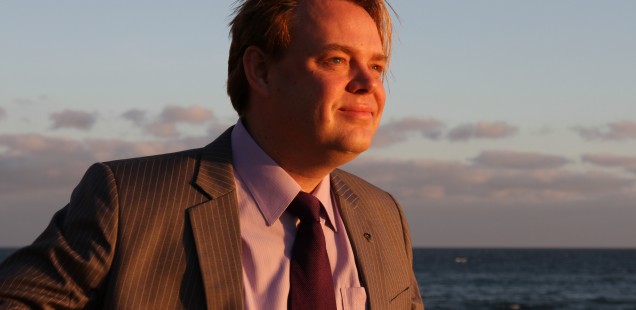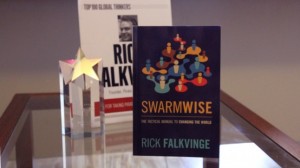How a Swarm of Pirates Can Redefine Politics According to Rick Falkvinge | PirateTimes

How a Swarm of Pirates Can Redefine Politics According to Rick Falkvinge
Having made a great impact in the fields of politics and human resource management, Rick Falkvinge, founder of the first Pirate Party in the world and political evangelist, led the Pirate Party of Sweden from nowhere in 2006 to the election of two MEPs in 2009.
In his coming book “Swarmwise: The tactical manual to changing the world “, published serially on his website before its release in July (when it will become available to download from The Pirate Bay), Rick describes his experience of managing a swarm of people with the least possible bureaucracy and how they managed to attract, like bees, more than 225,000 voters to secure two Pirates in the European Parliament, Amelia Andersdotter and Christian Engstrom.
Seven years after the founding of the first Pirate Party, such swarms have been formed in many countries and are preparing to continue not only the magnificent success of the Swedish Pirate Party but to conquer seats in their parliaments, regions and municipalities, as they gradually emerge in many countries such as Iceland, Germany, Czech Republic, Switzerland, Croatia and Greece.
“When I look at the evolution trajectory, I observe that we are following in the precise footsteps of every successful major political movement before us, such as Liberals, Labour, Greens” he answers when asked about the Pirate movement, giving a broader description of its electoral influence worldwide.
One of the world’s most influential people, one of the top 20 Internet Freedom Fighters and one of the Top 100 Global Thinkers, Rick Falkvinge talks to Pirate Times about a politicised (in the activist sense) ‘net generation bringing its values into politics:
“It’s just that they’re not identifying as politicians – they’re identifying as activists in opposition to the politicians. What we’re doing is making the leap and bringing our values, the values of the net generation, into politics. In such a way, we are redefining what politicians and politics can be.”
Pirate Times: Which was the defining moment that made you convinced it really deserves to establish the first Pirate Party?
Rick Falkvinge: I had been thinking about it over the fall of 2005, following yet another harshening of the copyright monopoly in the summer of 2005 in Sweden, as well as the software patent monopoly debate in the European Parliament that same summer. The definite trigger was when the Data Retention Directive was adopted by the European Parliament on December 14, 2005. You can see how the domain piratpartiet.se was registered on December 16, in preparations for my setting up the prototype website over the holidays.
These three events carried directly over to the first three pillars of PPSE – Culture, Knowledge, and Privacy.
Pirate Times: How did you feel on January 1st of 2006? Which is the picture that you recall most in your mind from that day?
Rick Falkvinge: January 1 actually wasn’t very eventful. I spent the day setting up an ugly website that I was going to launch as a very early beta in the evening – I expected little initial interest and that I would have time over the coming months to grow the initiative gradually and under control as interest slowly scaled up. I was wrong, very wrong about that part. I had been correct in picking the interesting topic, but I underestimated the enormous built-up demand.
As I took the website online at 20:30 CET and went into a DC++ hub – Ancient Spirit – and wrote two lines,
“Hey look, the Pirate Party has its website up now after new year’s.
…I didn’t really expect much to happen on the first day, or even the first week. I saw a dozen or so people come visit the server when I wrote those lines, then silence, then a gradually growing trickle of more people which presumably were people who had been sent the link by the first dozen visitors. After that, it just snowballed. The real attention started on January 2, and by the end of that day, there were about 300 activists wanting to be a part of this initiative. I had never expected it to grow that fast.
Pirate Times: Seven years later, how do you feel? Did you expect Pirate Parties would have been evolved that way? Are you satisfied with their progress so far?
Rick Falkvinge: “Satisfied” would imply that I was … I don’t know, giving orders? That I had the right to place expectations? I don’t really see it that way. I’m extremely happy with the progress of the movement as a whole, but it’s all of us that make the difference together. I had expected it to be necessary for the Swedish party to have a major breakthrough to show proof-of-concept to activists in other countries – the breakthrough we had in the European elections in 2009, when we put two Members of European Parliament in office. Rather, other activists seemed to have realized the potential in politicizing the net liberty issues immediately, and waited for nothing and no one in copying the initiative. Therefore, we now have a number of pirate parties that are running for office with decent chances of success.
When I look at the evolution trajectory, I observe that we are following in the precise footsteps of every successful major political movement before us (liberals, labor, greens, spaced about 40 years apart). While this can be a bit frustrating – nothing is ever new – it’s also comforting, as it becomes a predictor of similar success on continued hard work.
Pirate Times: What do you think about the future? Do you think next year’s euro elections will be a focal point for the development of Pirate Parties?
Rick Falkvinge: It will certainly be a bit of a test, not the least of our ability to cooperate across borders. While I believe we have a strong head start over previous political movements, we still have very little experience in doing so on an operational basis. However, I think it will be mostly for our own experience – I don’t see oldmedia putting us to the test on cross-border cooperation; they tend to have a very national, narrow focus.
Depending on the election outcome, I see a definite opportunity for growth of the movement. I would expect a rather strong showing.
Pirate Times: Recently you claimed on your page that the strength of the Pirates in the European parliament will be tripled. What are the critical factors Pirate Parties should and shouldn’t focus in? In which areas should they give a particular interesting?
Rick Falkvinge: True – I see three to four MEPs from Germany, one from Sweden and one from Finland as a credible outcome at this point in time. (The Swedish PP has two MEPs today, but rounding errors in the election result of 2009 worked enormously in our favor – Sweden has 20 MEPs, or 5% per MEP, and we got two MEPs with 7%.)
As for which areas we should be focusing on, I think we are all in agreement on the general direction we want society to progress toward – but every country has a different starting point and a different discourse. As they say, politics is always local. Things do flare up and when they do, we obviously need to use the opportunity, like the NSA story that’s still going rounds and rounds in oldmedia and hits our core policy like a tungsten rod from orbit.
Pirate Times: What’s your prognosis on the German elections in September? Are we going to be celebrating Pirates MPs in German Parliament? Do you think that the opening of the pirate agenda to all issues, from PPDE, does good or harm to the party?
Rick Falkvinge: At this stage it’s a flip of a coin. As an external observer, I think it’s very easy to play the sports critic and say that the PPDE was a victim of its own success when it peaked as high as 13% in the polls. Whether enough repairs have been done to the internal culture to deliver in September remains to be seen, but I remain hopeful that our great colleagues will be able to take advantage of events that happen between now and September 22 to highlight the need for transparency, privacy, and sharing.
I am convinced that we will all need to broaden our platforms at some stage of maturity, pretty much like the Greens have a common core but adopt their overall vision to local conditions. But – and this is important – the soul-searching part where you settle as a movement on your core identity can’t be skipped, and in my experience, that part of maturing takes a couple of years.
Pirate Times: What is your opinion about PPEU and PPI? Do you think that PPEU should be just for EU member countries or for all Europe?
Rick Falkvinge: At this point, I think it’s putting the cart before the horse. PPI’s value comes from the networking that international meetings enable, and not from having statutes and formal proceedings. There were such meetings far before the formal organization was founded, and while obviously a provocative opinion to some people, I question the value of a resourceless formal umbrella organization at this point in time. The same obviously goes for a formal PPEU.
Those who have worked with me know how I keep insisting that every activist organization must have the absolute minimum bureaucracy needed to work toward the end goal. Paperwork, statutes and formal rules need to be actively kept back, for bureaucracy is not only self-expanding, it is also activist-repelling. I write a lot more about this in my coming book Swarmwise.
Pirate Times: Do you think that a party must have positions, principles, on the economy and on other political issues as well or let its citizens decide about it?
Rick Falkvinge: I’m absolutely convinced this is necessary, but I’m equally convinced that you can’t go there until you know who you are and what the pirate movement is about at its core. If nothing else, we learned that in Sweden in the 2010 parliamentary elections. Responding “we choose to not take a stance on that issue” in nine out of ten fields was simply not good enough to earn people’s vote in the general elections like it had been in the European elections.
When I was walking the streets of Stockholm ahead of the election in 2010, I would walk up to people and talk to them:
– Hi, I’m from the Pirate Party. Have you heard of us?
– Hi, yes, yes, of course I have.
– Perhaps you’d like to see us in Parliament?
– Are you kidding me? You’re SO needed to make a difference there.
– Oh, thank you! So you’re going to vote for us, then?
– What? Oh no, I can’t possibly do that.
– But… why? You just said you want us to be in Parliament?
– Yes, of course, but I can’t vote for a party that doesn’t have a full platform, can’t you see that?
When you’ve heard that same message from 90-95% of the several hundred people you speak to in the streets, you realize that there’s a real obstacle to work on right here.
Pirate Times: What would you suggest to a Pirate to answer when he is attacked by others that Pirate Parties has no positions?
Rick Falkvinge: Well, there are two perspectives to this. The first, more for ourselves, is that all political movements that have become successful over the generations started out as single-value movements – not single-isse, but single-VALUE – and gradually deepened that value into an ideology that were able to answer questions on all, or at least most, issues in society. But it took them several years to mature to that point, and I don’t think that process can be rushed. I did an attempt at understanding our ideology with my Pirate Wheel and the ideology continues to be developed and refined. At this point, I’m leaning toward our core being one of self-empowerment of the identity, of how “identity” has become a key word as the world digitizes in a way it never has before.
The second perspective is what you actually say on the street, which would be something like “would you rather have a party with a narrow focus intent on delivering it, so you know exactly what you get, or one that promises the world and then drops 95% of it on the floor after the election?”. It sometimes works, sometimes not. Another one, depending on context, is “would you rather have freedom of speech or a 0.1% lower inflation? These issues are not playing in the same division.”
Pirate Times: How could a generation that states its hate for politicians and politics be politicized and activated?
Rick Falkvinge: This generation doesn’t hate politics at all – to the contrary, I’ve found that it is more involved in how society runs (or, as the case may be, walks, crawls, or doesn’t move at all) than any generation before it. It’s just that they’re not identifying as politicians – they’re identifying as activists in opposition to the politicians. What we’re doing is making the leap and bringing our values, the values of the net generation, into politics. In such a way, we are redefining what politicians and politics can be.
Pirate Times: In your experience, which is it that attracts most people to Pirate Parties and which is it that repels them?
Rick Falkvinge: Politics is a numbers game. In my experience, most people come for the file sharing, but stay for the understanding of the underlying issues of privacy and transparency once they see how that fits into the issue of sharing culture and knowledge.
Pirate Times: Will you continue to invest in Bitcoin and why?
Rick Falkvinge: Obviously. I’ve written a lot of blog articles on the topic, but I think it’s going to do to banks what e-mail did to the postal services. It’s disintermediation for the financial system. While it’s still in the experimental stage, there’s more and more services building the ecosystem by the week.
Pirate Times: At a political level, in which areas Pirate Parties can compete better the other parties?
Rick Falkvinge: Anything touching our core issues. If we’re not running circles around them on anything net or liberty related, we’re doing a very poor job.
Pirate Times: Which are the critical obstacles a swarm has to overcome?
Rick Falkvinge: This is all detailed in my book Swarmwise. The first chapters are published at falkvinge.net, and the physical book will be available in 2-3 weeks.
Pirate Times: Is it possible leaders of swarms to be trained about their responsibilities and how?
Rick Falkvinge: Absolutely, and doing so is crucial if you want to maintain a successful swarm.
Pirate Times: When is your book going to be published?
Rick Falkvinge: I have the proof for Swarmwise in hand here, and I hope one round-trip of fixes is going to be sufficient, but it may take two. We’re looking at July 1-ish or July 15-ish, depending on one or two round trips. Soon, in any case. It will be available on The Pirate Bay, as direct download in a number of formats, and in paper format for those who prefer.
Pirate Times: What are the most common mistakes that new Pirate Parties do?
Rick Falkvinge: Overdoing rules, regulations, and statutes. You don’t need bureaucracy. You need activism and you need to make activism fun. You should have the absolute minimum possible structure that supports activism – essentially having the org held together by duct tape just enough so that people can do activism. Bureaucracy kills activism and repels prospective activists. There’s much more on this in my book Swarmwise, too.
Pirate Times: What would be your number one advice to a new pirate party in order to succeed?
Rick Falkvinge: Read my book Swarmwise. That’s not one advice, arguably, but a whole book of them.
Pirate Times: As for the “Prism case” of wiretapping users of famous corporations’ services, what do you believe Pirate Parties have to do? Abandon these platforms and head to new ones or stay in and fight for users’ rights?
Rick Falkvinge: When you’re trying to educate people about an idea, you don’t get to choose where other people are. If people are on Facebook, that’s where you have to be, too. But you also need to be very aware of the information game, not ever writing anything sensite in, say, a “private” message on Facebook. Use PGP, Redphone, Mumble, Crypto.cat for anything remotely sensitive. Use public communications to reach people where they are. No politician ever won by shutting themselves into an ivory tower, and that goes for us to. Get your hands dirty and your feet out to where people are.
Pirate Times: After Edward Snowden’s revelations about “Prism” do you think protection of whistleblowers should be Pirate Parties mission No 1?
Rick Falkvinge: It’s important, but it falls so perfectly from our general values, that I wouldn’t set it as #1. It’s a particular issue that falls directly from our principles of privacy, accountability, and transparency. It’s an issue that we can use in oldmedia to highlight those perspectives and principles, but I would not set it anywhere a top spot of priorities.
Featured image: CC BY-SA Rick Falkvinge

About Stathis Leivaditis
The English “pirate” is derived from the Greek word “πειρατής” (peiratēs) and this in turn from the verb “πειράομαι” (peiráomai), “I attempt”, which is a derivative of the noun “πείρα” (peîra), “experience”. Coming from the depths of the centuries, the word “pirate” took on another dimension in our days. The ruling classes saw pirates as rebels and hated them. Rebels without a state, they were not submissive to any law, except from the laws they instituted themselves, improvising together. This is the feeling of a Pirate: when something doesn’t work, you have to attempt to bring a new concept. Sometimes it goes beyond a certain point and perhaps exceeds certain limits, because it is an expression of challenge; the challenge to change the system. I’m a member of the Board (and former chairman) of Pirate Party of Greece, also a member of press team of PPGR, former journalist, now a free lancer. I’m in the team of Pirate Times from the start, I joined voluntarily and consciously because I am interested to meet pirates from around the world, to exchange views and spread the pirate spirit.
All content is CC-BY if not mentioned otherwise. Please link back to us if using content.














disqus_sDwkcTIQXP
joe col